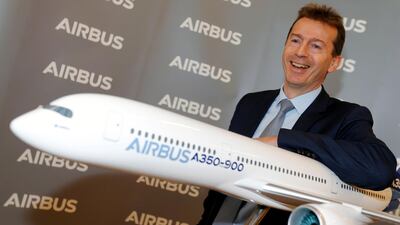A zero-emission commercial jet could still be ready by the early 2030s but requires decisive action across multiple industries to make it happen, aviation experts said on Tuesday.
Speaking at a panel at the virtual Farnborough Airshow, Glenn Llewellyn, vice president of zero-emissions technology at industry giant Airbus, said the aerospace company was particularly excited about using hydrogen as a carbon-friendly energy source.
But he gave a warning that there needed to be “significant” decisions made in the coming years to ensure technology can be developed quickly.
Eamonn Beirne, head of emerging aviation technologies at the British transport ministry, said putting together a zero-emissions plane was at the heart of the UK government’s plans.
The chief technology officer and head of strategy at GKN Airspace, Russ Dunn, said rapid advances in improving aircraft efficiency were possible given how quickly the industry is progressing if such advances were combined with sustainable fuel sources.
“It’s about getting the right economic conditions and the right opportunities for the right aircraft and engines to be developed. There’s a huge amount that is right there at our fingertips that we could exploit,” he said.
Mr Llewellyn of Airbus said the company felt that properly utilising hydrogen could “allow us to potentially significantly reduce aviation’s climate impact” as he noted how it could be produced from solar or wind power.
“At Airbus we’ve been very clear recently that we have the ambition to bring a zero-emission commercial airliner to market in the early 2030s,” he said.
“One of the most promising technologies to allow us to do that is hydrogen. Why hydrogen? Mainly because we believe we need to position the aviation industry to be powered by renewable energy and hydrogen is a very good surrogate for allowing us to do that,” he added.
But Mr Llewellyn said companies such as Airbus needed to partner with an array of partners to move forward.
“It means that we need to work beyond the typical aircraft manufacturer borders and work with the automotive industry, which has worked a lot with hydrogen over the last decades.
“We need to work as well with the space industry, which has used hydrogen for several space applications and which we need to benefit from in order to accelerate the relevance of this technology for aviation,” he said.
“We also need to work with energy providers, hydrogen providers and airports because one of the key challenges in what we’re doing is about bringing hydrogen infrastructure to airports, and hydrogen supply at a relevant cost to the airports in the early 2030s time frame,” he added.


